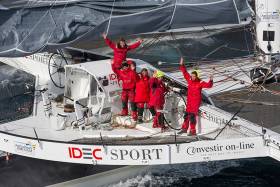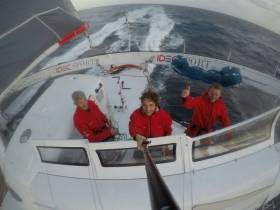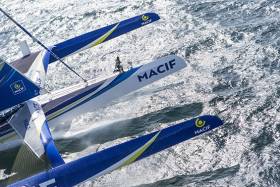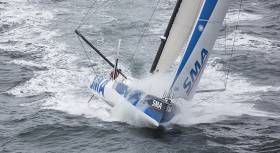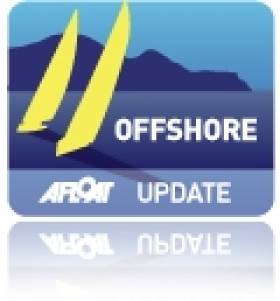Displaying items by tag: Trimaran
The maxi trimaran Sails of Change set out from New York at 13:10:08 UTC on Thursday in an attempt to break the trans-Atlantic record. Yann Guichard and his 11-strong crew arrived in the United States the day before to take advantage of a favourable weather window. In their sights is the record set by Pascal Bidegorry aboard the same boat in August 2009 of 3 days, 15 hours and 25 minutes.
 Sails of Change and Spindrift crew ready to attempt the North Atlantic Record
Sails of Change and Spindrift crew ready to attempt the North Atlantic Record
The Sails for Change crew set off for New York on Wednesday to prepare to set off at 1200 UTC on one of the most prestigious records in the sailing world: crossing the Atlantic from west to east. The maxi trimaran arrived on the US east coast last May to prepare for the attempt.
"It's one of the most incredible records to go after, along with the Jules Verne Trophy and the 24-hour record," said Yann Guichard."To beat it we need to maintain an average speed of around 33 knots throughout the attempt.
"As soon as we landed, we got together on the boat to get ready and cast off. The record period is between July and early November so we wanted to be ready, while keeping an eye of the most favourable weather window."
A well-trained and determined crew
In an attempt to break the record, Yann can count on a well-trained and cohesive team. The 11 sailors around him are all experienced ocean racers and time-trial challengers, many of whom have been on stand-by over the winter for an attempt at the round-the-world Jules Verne Trophy. All know they will need to be cool-headed, fully focused and determined to take on this incredible challenge.
"There's a great state of mind — everyone decided to come at the last moment," said Yann. "We all want to give it our all and try our luck."
They have an incredible tool at their disposal: the largest ocean-racing trimaran ever designed at 37 metres long and 23 metres wide. Sails of Change holds two Jules Verne Trophies (2012, 2017), the Discovery Route record between Cadiz and San Salvador (2013) and a prestigious win in the Transat Quebec - Saint Malo (2016).
A prestigious 14-year-old record
Sails of Change passed the Ambrose Light, the startling line for the attempt, at 13:10:08 UTC (09:10:08 EST), and is now heading for Lizard Point on Great Britain's southwest coast, a course of 2,880 miles (5,330 km), across the heart of the North Atlantic.
The weather window identified by the Sails of Change team offered the right conditions for the attempt. "The two weather models seem to be aligned," said Yann. "We should set off ahead of a low-pressure system forming on the east coast, which will move northwards. "Throughout the crossing, the wind will be from the south, southwest. The whole crossing should be on a starboard tack with only one or two gybes. The conditions will put us well within the record time."
The North Atlantic record has a special place in ocean racing history. It has been held by Banque Populaire V — now Sails of Change — since 2009, when Pascal Bidegorry and his crew set a new record of 3 days, 15 hours and 25 minutes.
Yann Guichard knows what is required having been one of the crews who broke the record in 2006, 4 days and 8 hours with Orange II, and again in 2007 on Groupama 3 in a time of 4 days and 3 hours. The skipper is out to take it again aboard Sails of Change.
The crew of Sails of Change
- Yann Guichard (skipper)
- Duncan Spath (helmsman)
- Benjamin Schwartz (navigator)
- Xavier Revil (watch leader)
- Jacques Guichard (watch leader)
- Thierry Chabagny (helmsman-trimmer)
- Grégory Gendron (trimmer)
- Loic Le Mignon (trimmer)
- Thibault Julien (trimmer)
- Christopher Pratt (helmsman-trimmer)
- Clément Giraud (bowman)
- Pieter Tack (bowman)
The IDEC SPORT Maxi Trimaran Finishes in Record Time
The Maxi Trimaran IDEC SPORT sailed by Francis Joyon, Clément Surtel, Alex Pella, Bernard Stamm, Gwénolé Gahinet and Sébastien Audigane won the Jules Verne Trophy, the outright round the world sailing record, this morning.
They crossed the finish at 0749hrs UTC on Thursday 26th January 2017.
Francis Joyon and his crew sailed the 22,461 theoretical miles in 40 days, 23 hours, 30 minutes and 30 seconds, at an average speed of 22.84 knots.
Out on the water, they actually sailed 26,412 miles at an average speed of 26.85 knots.
They shattered the previous record set by Loïck Peyron and the crew of the maxi trimaran Banque Populaire V by 4 days, 14 hours, 12 minutes and 23 seconds.
During this round the world voyage, they smashed no fewer than six intermediate records at Cape Leeuwin, off Tasmania, on the International Date Line, at Cape Horn, at the Equator and off Ushant.
Francis Joyon & IDEC Trimaran Reach Doldrums in Four Days
Frech offshore racers who are on their Round the world record bid for the Jules Verne Trophy have made great progress in the first few days of their record attempt. Francis Joyon and his crew of five aboard the IDEC SPORT maxi-trimaran will be facing the Doldrums late this evening. It will only have taken the elite squad four and a half days to reach this area of great instability, which stretches out a few degrees north of the Equator. The width and level of activity of this zone, where forecasts are not very reliable, will have a major effect on the time it takes the red and white maxi-trimaran to complete this first stretch of the Jules Verne Trophy. Averaging over thirty knots out on the water and 25.5 on the great circle route, Francis, Clément, Alex, Seb, Bernard and Gwéno have found just the right mixture of energy, concentration and vigilance to obtain a very good time between Ushant and the Equator. Will the final determining factor, the Doldrums, be kind to them? Joyon wants to believe so, stressing with a smile that “the Doldrums can't have it in for us twice.
With a lead of 100 miles at the start of this fifth day of racing, having sailed 3000 miles out on the water on a fairly straight course with just five minor gybes, Joyon's boys have made the most of a weather opportunity that was far from being ideal. Francis Joyon cannot explain that other than by pointing out how hard the lads have been working in a joyful atmosphere, where everyone has played their part in each watch. “It's true that with the short mast and small crew, there have been weight savings and IDEC SPORT is behaving really well in these relatively stable trade winds on fairly calm seas. We are able to get the most out of the boat and she cuts magnificently through the water, which makes it a real pleasure to be at the helm. The combination of sails in this wind angle works remarkably well.”
IDEC SPORT is about to tackle all the uncertainties of the Doldrums. After the deep annoyance of November's voyage in this zone, Joyon believes he will be lucky this time. He also believes in the advice and observations that Marcel van Triest is offering from ashore. He has seen an ideal entry point to get to the Southern Hemisphere at a longitude of 25 degrees west. The SE'ly trade winds can already be felt and should offer a decent crossing into the vagaries of the mighty South Atlantic.
The tiredness that they are bound to be feeling at this point has not dampened the enthusiasm and determination of the six sailors on IDEC SPORT, who are aiming to get their revenge in the Doldrums after their disappointment in November. Records are won through determination, enthusiasm, inspiration and talent, but luck also plays its part. The hand of fate could offer Joyon and his boys a well deserved reward this evening for their obstinacy.
Gabart Takes Line Honours in The Transat Bakerly 2016
Frenchman François Gabart on board his new 100ft trimaran Macif, crossed The Transat bakerly finish line at 18:24 EDT (22:24 GMT) this evening off New York, taking line honours in the Ultime class.
The finish time, recorded by the Sandy Hook Pilot Association boat, marks the first solo race win on Macif for the 33-year-old, who in 2013 became the youngest ever winner of the Vendée Globe solo round-the-world race. Gabart covered the official course distance of 3,050 nautical miles in 8 days, 8 hours, 54 minutes and 39 seconds.
Gabart actually sailed a total distance of 4,634 miles at an average speed of 23.11 knots in a remarkable voyage. Unusually for The Transat bakerly, it took him, and his close rival Thomas Coville on Sodebo, hundreds of miles south of the Azores into the tradewinds before sling-shotting northwest up to New York.
As Gabart crossed the line Coville was still some 118nm from the finish while the third-placed trimaran in the Ultime class – Actual skippered by Yves Le Blevec – was still 509.6nm away.
Two of the fastest racing machines in sailing are currently lighting up the top of the leaderboard in The Transat bakerly as they rampage across the Atlantic just a few miles apart.
After two full days of racing in the 3,050-mile classic from Plymouth to New York, the leading pair of Ultimes, Macif skippered by Francois Gabart and Sodebo skippered by Thomas Coville, are thrashing along at average speeds of over 30 knots.
The two giant trimarans are being pushed to the limit and have already covered more than 1,100 nautical miles since the start on Monday afternoon. But most of that distance has been eaten up by miles to the south, leaving the “miles-to-go” figure to the Big Apple still up around 2,500.
This afternoon the two giants were about 30 miles apart about 550 miles west, south-west of the southern tip of Portugal, with Sodebo marginally ahead in terms of distance to the finish by virtue of its more northerly position. Current routing models suggests these two could finish in five days time and will sail a course downwind to the south of the Azores.
About 400 miles north of them, the leading boats in the IMOCA 60 monohull fleet and the Multi50 trimarans are now heading out into the Atlantic after turning to starboard off Cape Finisterre. For these skippers conditions are manageable at present, but in all their minds is an appointment with strong headwinds and big seas that will hit them on Friday morning.
A complex area of low pressure is heading their way and there are predictions of winds gusting in excess of 40 knots in what promises to be a truly authentic Transat ordeal. Jean-Pierre Dick, who is lying in third place in the IMOCA fleet on board St Michel-Virbac, reckons tackling this depression will be critical to the outcome of the race.
“On the weather files, I see a snarling depression arriving in two days,” said Dick succinctly. “We'll have to make a crucial choice to bypass these very strong winds (40 knots in the forecast or more). This will be very physical and strategic: the key point of the race."
A little further east, Paul Meilhat on SMA in fourth place, and 135 miles behind the IMOCA leader Vincent Riou on PRB, was assessing the same weather feature. Meilhat had a bad start to the race but is happy with his performance to date, having done little in the build-up because his boat was being re-fitted.
“Since the wind came in, it's been going well,” he said. “I have not had a lot of sailing with my boat before the race, so it suits me well. We got up to 30-35 knots at Cape Finisterre with great seas amid all the shipping lanes. Now it’s a case of how to negotiate this Azorean depression: I'll look at what others are doing, but overall, I do not intend to confront 50 knots."
Like the Ultimes, the Multi50 race features a duel for the lead following the abandonment by Erwan Le Roux with float damage on FenêtréA Cardinal on Tuesday evening. In his place the remaining four boats are being led by Lalou Roucayrol on Arkema and Gilles Lamirè on French tech Rennes St Malo who are reaching along at 20 knots about 25 miles apart, 300 miles due west of Porto.
While they will face the same headwinds as the IMOCAs, more than 400 miles north of them, the third-placed entry in the class, Pierre Antoine on board Olmix is hoping to surf on favourable winds on the northern edge of the same system.
Olmix is the oldest Multi50 in the fleet and is currently the most northerly boat taking part in the race, but her skipper is happy with his choice.
"For now, I only have 15-20 knots from the south-west, but it will build,” he said on the satellite phone earlier today. “It's a little wetter and colder than in the south, but it is an interesting option to be in the north. The boat is going well and the skipper too. It's nice to see that everyone does not follow the same road… We will see how it turns out in the Azores.”
In the Class40 monohulls, meanwhile, the race to the west has begun with all the skippers turning hard-right mid-way across the Bay of Biscay. With nine of the 10 starters still racing after the retirement of Maxime Sorel aboard VandB following a collision with a container ship, the lead is being disputed by Britain’s Phil Sharp on Imerys and Thibaut Vauchel-Camus on Solidaires en Peloton-Arsep who is loving the fast sailing conditions.
"Life on board is very good," the French skipper reported. "It’s a little bit cold and wet, but it’s good. I just gybed west and the boat is going well. Everything onboard is ok, I’ve had no breakages, I feel good and I’m eating well – it’s all ok."
"We’ve had about 20 to 22 knots today, we’ve been sailing very fast downwind with one reef. I really like these conditions."
The pair are only three miles apart in terms of distance to the finish and are heading into lighter winds before conditions ramp up later on Friday.
French trimaran IDEC SPORT Hits 'UFO' 130 Miles off the Irish Coast
The massive French trimaran IDEC SPORT has hit an unidentified floating object during the night, 130 miles off the southwest coast of Ireland. The port rudder is broken. However they are still expected to reach the pontoon in Brest at 1900hrs UTC after its failed Jules Verne Trophy attempt.
At around 0300hrs this morning, just over 130 miles SW of Ireland in heavy seas, the crew on IDEC SPORT heard two big bangs, indicating that they had hit an unidentified floating object (a container, plank of wood, or something else?).
Once they had got over the scare, Francis Joyon’s crew saw that the port rudder was broken. On the starboard tack, only the central rudder can be used to steer the boat. Six hours after suffering this damage, IDEC SPORT was still making 30 knots towards the finish, which at 0900hrs this morning was 230 miles away. So for the time being the men are still expected to finish in Brest at around 1900hrs this evening.
Sailor Rescued From Storm-Damaged Trimaran After 12 Hours Adrift
#Offshore - A British yachtsman faced a "terrifying" ordeal after his trimaran was damaged in stormy weather, stranding him at sea some 40 miles off the Isle of Wight.
Mail Online reports on Mick Royton's struggle to keep himself afloat on the upturned hull of his vessel after it de-masted in high winds and damaged two of its three hulls striking a log.
He was able to put in a mayday call but rescuers were held back by worsening conditions at sea.
It was only by chance that a Royal Navy frigate, HMS St Albans, discovered Royton clinging to the remains of his yacht Kinetic in the early hours of yesterday morning (7 October) some 12 hours later.
Andy Sergeant, coxswain for Weymouth lifeboat coxswain Andy Sergeant, whose crew assisted in his rescue said of Royton: "He was very lucky to have been found."
Mail Online has much more on the story HERE.
#Spindrift - The race-winning multihull Spindrift has capsized in gale force winds off Dun Laoghaire this afternoon (22 June) at the start of the Route des Princes series of inshore racing spectacle on Dublin Bay, as David O'Brien reports on scene.
The MOD70 trimaran that was first into Dun Laoghaire from Lisbon on Wednesday capsized meres from spectators in Scotsman's Bay ahead of the first of three inshore races.
Rescue photos below.
The accident happened about 700 metres off the starting line in the first race, as the boats were accelerating in the strong and gusty winds. The boats were not carrying full sail as a precaution against the strong offshore winds blowing in the bay. Today's in–port racing was billed as 'fast and furious'.
At least one person is injured and is being treated upturned hull of the stricken craft. As of 3.08pm a rescue helicopter was dropping its winchman to the vessel.
It is feared by National Yacht Club personnel that the mast of the inverted trimaran is stuck in the sea bed and may be broken.
All racing has now been postponed as rescue services attended the scene. Eight crew were onboard the vessel at the time of the capsize.
Update 3.10pm: All other boats have returned to Dun Laoghaire Harbour as rescue services continue to attend to the capsized Spindrift and its crew.
Update 3.18pm: Weather conditions in Dun Laoghaire continue to be strong and gusty, and it's reported that some local DBSC RC racing had already been cancelled earlier today.
Update 3.27pm: A news update on the Route des Princes website (via @sailracewin) says one crewman on the upturned Spindrift has a back pain.
Update 3.35pm: Twitter users Mark Lloyd (@Lloyd_Images) and Philip Bromwell (@philipbromwell) have posted photos of the failed Spindrift in Dublin Bay as emergency services attend to the scene.
Update 3.39pm: The crewman casualty has been winched to the helicopter and is being airlifted to Tallaght Hospital. His condition remains unclear.
Update 3.41pm: Triage for any injured racers has been set up at the National Yacht Club and all rescue boats have been asked to report to the NYC to account for numbers.
Update 3.53pm: Assessments are currently being made as to how to recover the 70ft hull still floating north of Dalkey Island.
Update 4.04pm: Sailing journalist Kate Laven comments on Twitter re the Spindrift capsize: "Everyone recovered but two injured"
Update 4.08pm: The Route des Princes website has followed up its earlier update with a news post which confirms that weather conditions at the time of the Spindrift capsize were 20 knots with strong gusts.
Update 4.55pm: Dun Laoghaire lifeboat towing the upturned Spindrift hull (minus mast) towards Dun Laoghaire harbour
Update 6,00pm: The upturned hull has been successfully righted, the hull is intact but the mast is broken.
Update 7.00pm: There are unconfirmed reports that the injury to the Spindrift crew man is a broken pelvis.
Update 8.00pm: Spindrift racing team release statement on capsize and injury to crew member
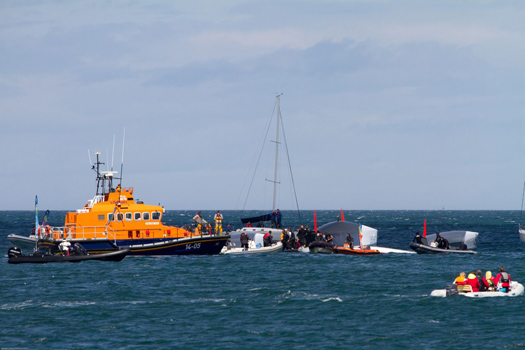
Rescue craft, local boats and the Dun Laoghaire lifeboat attend the upturned hull. Photo: Gareth Craig
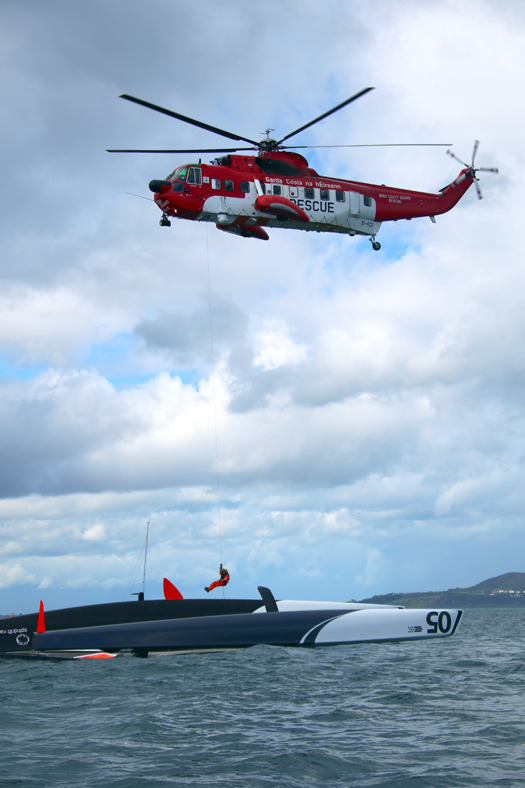
The Coastguard helicopter arrives on scene and a winch man is lowered to make an assessment. Photo: Afloat.ie
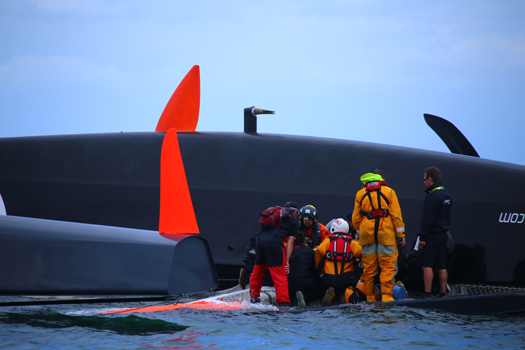
Rescue personnel and Sprindrift crew on the upturned hull in Dublin Bay this afternoon. Photo: Afloat.ie
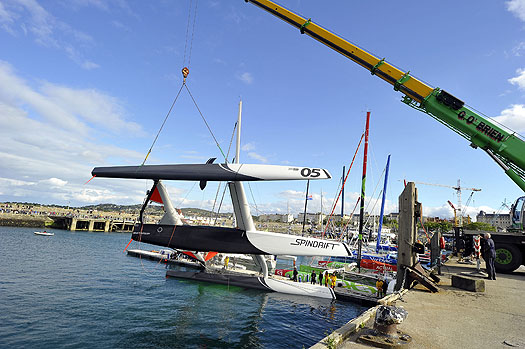
Spindrift minus her mast is lifted in Dun Laoghaire harbour this evening. Photo: Michael Chester
Banque Populaire V Takes Jules Verne Trophy, Smashing World Record
#WORLD RECORD - France's Banque Populaire V has smashed the record for the fastest yacht sailing around the world, shaving nearly three days off the previous best.
BBC News reports that the yacht's 14-man crew crossed the line at 45 days, 13 hours, 42 minutes and 53 seconds to claim the Jules Verne Trophy - knocking 2 days, 18 hours, 1 minute and 59 seconds off the standing world record set by Groupama 3 nearly two years ago.
The 40-metre trimaran, which last year also set a record time in the gruelling Fastnet Race, raced around the globe with an average speed of 26.5 knots.
And the Loïck Peyron-skippered yacht would have beaten the challenge even sooner had it not been delayed for almost two days due to bad weather.
"It was an amazing feeling crossing the line," said crew member Brian Thompson in an audio interview with sailor Hannah White.
Franck Cammas, skipper of Groupama 3 and currently competing in the Volvo Ocean Race, also offered his congratulations to the Banque Populaire team.
"Obviously it's a superb performance as it's always complicated to sail around the world," he told Sail World. "Aboard boats which go so fast, you have to know how to keep pace and drive them at the right speed so as not to break them.
"The crew of Banque Populaire knew how to do it and they did a fine job."
Dun Laoghaire Earmarked For Stop on First MOD70 Euro Tour
#DUBLIN BAY NEWS - The inaugural European Tour for the MOD70 trimaran class is set to come to Dublin next summer, pending agreement with the relative authorities in January.
The Irish Times reports that the National Yacht Club is at the head of efforts to include an event in Dun Laoghaire on the first tour for the new 70-foot design.
But apart from the Dun Laoghaire Harbour Company, there has so far been little support from local or national authorities despite organisers waiving the €250,000 franchise fee.
John McKenna of tour organiser OC Thirdpole says he is determined to ensure Dublin is included, and that costs will be borne by the competing teams.
However, he added: "The tour needs to be assured that it will have a major public occasion in Dublin if it is to commit to coming here."
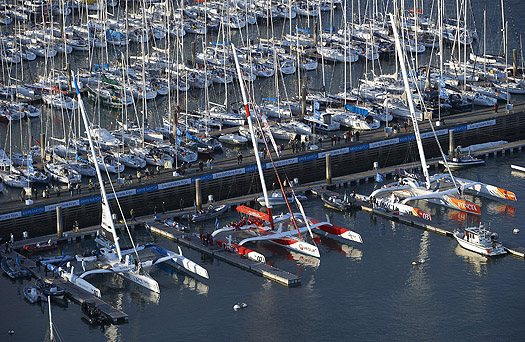
The MOD 70 fleet – plans are afoot to bring the fleet to Dun Laoghaire and moor them off the National Yacht Club at the Carlisle Pier
As previously reported on Afloat.ie, Dublin Bay welcomed its first MOD70 earlier this year when yachtsman Roland Jourdain tested his Veolia Environnement trimaran ahead of the Fastnet Race.
The Irish Times has more on the story HERE.


























